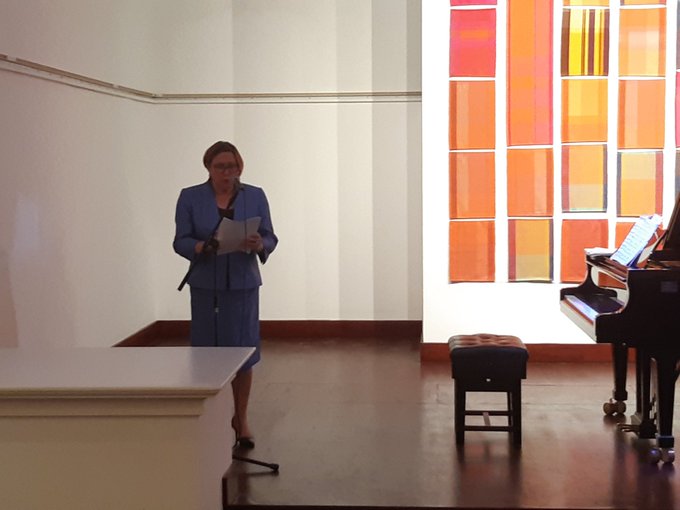
 |
||||
|---|---|---|---|---|
| Volume 53 Number 22, July 26, 2023 | ARCHIVE | HOME | JBCENTRE | SUBSCRIBE |

July 26 marks one of the most important dates celebrated in Cuba: Moncada Day, or the National Day of Rebellion. Seventy years ago on that day, revolutionary youth led by Fidel Castro launched an attack on the Moncada and the Carlos Manuel de Céspedes Barracks in Santiago de Cuba and Bayamo respectively, two of the main garrisons of the reactionary dictatorship of Fulgencio Batista. Moncada in particular was the regime's military stronghold in the south of Cuba, the second largest barracks in the country and a symbol of its power. The goal was to seize the weapons and distribute them to the people and spark a national uprising that would not only overthrow the Batista dictatorship but also establish Cuba's independence and sovereignty. The attacks were carried out by an organisation that was created in 1952, under the leadership of Fidel Castro.

The Moncada martyrs
Of the 120 or so youth who were part of the attacks, approximately 70 were killed and many others were later tortured and executed. The survivors, including Fidel Castro, were subsequently put on trial and sentenced to long prison terms. At his trial, with great prescience, Fidel Castro delivered his famous speech "History Will Absolve Me" which laid out the national and social goals of the revolutionary movement that eventually triumphed over the dictatorship on January 1, 1959.
Most of the Moncada fighters, including Fidel Castro, were released after they won amnesty in May 1955 due to the broad mobilisation of support from the Cuban people for the aims of the action. They would later regroup in Mexico, joined by Che Guevara and others, returning to continue the armed struggle a year and a half later.

"History Will Absolve Me," poster commissioned
by the Communist Party of Cuba in 1973 on the 20th anniversary of the Moncada
attack.
This audacious action became the rallying cry for the fight of the youth of Cuba for a bright future for themselves and the nation. It played a decisive role in galvanising the struggle of the Cuban people to affirm their sovereignty, ultimately leading to the victory of the Cuban Revolution in 1959. The action also stirred the revolutionary spirit of the peoples of the world.
To this day, this bold action on July 26, 1953 symbolises the revolutionary spirit and audacity of the Cuban people. It symbolises their recognition of their right to decide their own fate free from foreign interference or domination. It is this same spirit of defiance that has enabled Cuba to not only withstand the genocidal blockade by the US imperialists, but to consolidate the Revolution and provide for the well-being of its people and broaden its internationalist assistance to the peoples of the world despite all the difficulties.
Workers' Weekly sends its revolutionary greetings to the Cuban people and their leadership. Cuba stands on its own two feet and holds its head high. This spirit is indomitable because it upholds a just cause which, moreover, it shares in common with the peoples of the entire world.

On the occasion of National Rebellion Day, RCPB(ML) send a contratulatory message to the Cuban Ambassador in London, H E Bárbara E Montalvo Álvarez. The message said in part: "RCPB(ML) takes this opportunity to salute the achievements of the Cuban Revolution and the ongoing work of the Cuban people and their Communist Party. On behalf of the working class and people of Britain, we pledge to continue to stand with the Cuban people and their revolution! We once again demand that the barbarous and cruel US blockade and sanctions against Cuba be ended.
"We appreciate how much the bold action of July 26, 1953, symbolises the revolutionary spirit and audacity of the Cuban people, the recognition of their right to decide their own fate free from foreign interference or domination. Today, and with the history of 70 years of heroic struggle, it demonstrates that Cuba is determined to affirm its right to pursue its own independent path, and with this it gives inspiration also to that same struggle of the peoples of the entire globe."
Long Live the Cuban Revolution!
London Embassy of the Republic of Cuba Organises Wonderful Cultural Gala to Mark National Rebellion Day

Cuban Ambassador H E Bárbara E Montalvo opening
the Gala
With the precept that Cuban culture is the shield and sword of the nation, the UK Embassy of the Republic of Cuba organised a Cultural Gala on July 25, to mark the National Rebellion Day and the 70th anniversary of the attack on the Moncada barracks.
Cuban Ambassador H E Bárbara E Montalvo opened the Gala. In her speech, she said:
"National Rebellion Day is and will be one of the most important dates in the long and heroic struggle of our country for its independence. The assault on Moncada was the resumption of the armed struggle for true independence. The Moncada Barracks assault was deeply inspiring, although it was not successful. It was not the end, but the beginning."
The Ambassador emphasised that "the importance of the participation of the people in the struggle, the value of perseverance in the effort, and not losing heart in the face of any setback, in the face of any difficulty."
The cultural programme featured soprano Olga Ileana Jiménez and pianist Eralys Fernández, who both studied initially at the University of the Arts in Cuba. They performed a programme of Cuban classical songs, songs of identity and Cubanness, and a selection of five Cuban danzas by Ignacio Cervantes.
For two short clips of the music, see:
https://twitter.com/i/status/1683909184658472978
https://twitter.com/i/status/1684108331105898498

